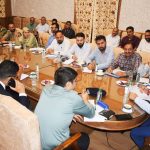They say education is the great equalizer. But walk into any classroom today—be it in Srinagar, Delhi, or Bangalore—and you’ll find not students chasing knowledge, but children sprinting through a rat race. The spark of learning has been replaced with the pressure of performance. Dreams are being measured in marks. And we, the adults—parents, teachers, and policymakers—have, perhaps unknowingly, built this treadmill and then forced our children to run on it.
I often think back to a scene I witnessed outside a coaching center. A boy, barely fifteen, had tears in his eyes. His mother was pleading with the receptionist to allow him into a “repeat batch” for medical entrance coaching. “He got only 88% in Class 10, sir… please give him a chance.” Only 88%? I stood still. Not because of the number, but because of the weight of that word “only.” When did 88% become something to be ashamed off? What have we done to our children, to our society, that anything short of perfection is now seen as failure?
This is not just a story from Kashmir. This is the story of every child across the country. We are a nation blessed with young minds—curious, intelligent, full of potential—but we are stifling them under the burden of unrealistic expectations. We are producing toppers, not thinkers. Technocrats, not problem-solvers. The race begins early—coaching from Class 6, tuition from Class 1, competitive exams by Class 10. The timetable is tight, the pressure is relentless, and somewhere along the way, the child stops being a learner and becomes a product.
In our homes, we still cling to the “safe” professions—doctor, engineer, civil servant. These are good careers, no doubt. But somewhere along the way, we turned them into the only careers. A child who dreams of becoming a writer, a designer, a teacher, a researcher, or a social worker is gently told to “keep it as a hobby.” Success is equated with income, not impact. Security is valued more than satisfaction. Our children are not just expected to succeed—they’re expected to succeed in predefined, socially acceptable ways.
Kashmir, in particular, faces a more suffocating version of this rat race. Ours is a region marked by years of uncertainty—conflict, frequent school closures, loss of classroom time, digital divides, and psychological distress. The academic gap left behind is rarely addressed with empathy. Instead, students are thrown back into the system with even more pressure to “cover the syllabus” and “catch up” with the rest of the country.
Coaching centres flourish; libraries remain empty. The pursuit of ranks overshadows the hunger for truth. The result? A generation of young people who are afraid of failure more than they are inspired by curiosity. And yet, education was never meant to be like this.
The great thinkers—Rumi, Tagore, Iqbal—did not pursue knowledge for grades. They studied to understand, to connect with the world and the self. The Prophet Muhammad (PBUH) called the pursuit of knowledge an obligation for every man and woman—not to earn a position or salary, but to grow spiritually and morally.
Somewhere in our blind race toward performance and prestige, we lost this vision. We turned schools into factories, students into machines, and dreams into quotas. It is easy to feel hopeless, but it is not too late. The first step is to pause, to reflect honestly. We need to ask the difficult questions—not to blame, but to rebuild.
What are we truly preparing our children for? Are we raising individuals who know how to think independently, who can question with courage, and who can feel with compassion? Or are we just raising young people who know how to memorise and score?
Do our classrooms allow room for exploration, or do they punish students who step outside the syllabus? Can a student fail in mathematics and still be brilliant in life? We must find the courage to say: yes. And then act upon it.
As educators, we must go beyond textbooks. A good teacher does more than deliver content—they notice when a student is silent, they spark discussions that go off-script, and they understand that real learning can’t be measured in one-hour tests.
As parents, our role is even more delicate. We must let go of the obsession with numbers. Ask your child not only “how much did you score?” but “how are you feeling?” “What did you discover today?” “What made you curious?” Our children are not projects to be completed—they are people to be nurtured.
As a society, we must start celebrating all kinds of intelligence. The child who can paint is not less valuable than the one who can code. The one who wants to serve people through social work is not less ambitious than the one who wants to be a surgeon. We need poets, philosophers, psychologists, environmentalists, teachers, technicians, and artists as much as we need engineers and doctors.
And finally, we must address mental health as part of this conversation. Anxiety, burnout, and fear of failure are swallowing our youth in silence. We must bring counseling into our schools, provide platforms where students can share their stories, and build spaces that allow them to breathe not just compete.
The future does not need more toppers. It needs more truth-seekers. More listeners. More problem-solvers. More ethical, empathetic, self-aware citizens. The goal of education should not be to produce someone who can crack an entrance test, but someone who can live meaningfully, contribute justly, and think independently.
This change will not come from above. It will come from everyday choices by teachers who give space to curiosity, by parents who choose understanding over pressure, by schools that foster growth instead of fear, and by communities that allow children to dream freely. We owe this to our children. We owe this to ourselves. Let’s bring back the soul of education before we lose another generation to a race that never really had a finish line.
(Author is a public speaker from Achan, Pulwama and has done Master’s in International Politics from Aligarh Muslim University. He can be reached on [email protected])








